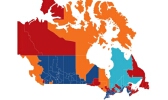
Canada is in crisis. In many ways, that crisis is similar to that faced by the European Union and its recent loss of Britain as a constituent member of that union.
In this, the second part of our conversation with Dr Salim Mansur, professor emeritus of political science at Western University, we discover that the fluid dynamics of the nation-state can easily lead to alienation ‘within’ nations. When interests and common values once shared instead become a source of conflict and cause for national divisions, the resulting alienation may lead to the literal formation of alien nations.
Given the rise and fall of the nation-state throughout history, it is clear that nations are far more fragile than most people generally perceive. The temporary duration of the various political structures under which humankind has been governed or ruled throughout history merits due consideration.
After having considered the state of the unions known as Britain, Europe, and America, our attention now turns to Canada, the country that many consider to be the ‘odd man out’ with regard to the most recent political shifts in the Anglosphere.
It is impossible to predict what kind of country Canada might become in the years ahead. What will the operative philosophy of Canada be – freedom or statism? With what nations might Canada develop or cease alliances, unions, and relationships as we head into the middle of the 21st century?
Canadian news reports are filled with stories related to this very crisis: from Alberta’s expressions of alienation to the protests staged by various aboriginal groups operating under the very significant identity of ‘First Nations.’ (Might this imply that Canada and the provinces within it are ‘second,’ ‘third,’ and ‘fourth’ nations?)
In the wake of Alberta’s victorious Supreme Court challenge striking down the imposition of Canada’s federal carbon taxes on the province earlier this week, our discussion takes on an added significance. The decision represents a re-affirmation of distinct federal/provincial jurisdictions and represents a setback for Justin Trudeau’s globalist ‘climate change’ agenda.
Politically, the only Canadian federal party that appears determined to respect the division of powers and jurisdictions between the federal government and the provinces as a matter of principle is the People’s Party of Canada (PPC). But as a newly formed political party, it has yet to win a seat in parliament.
Given current circumstances, it appears that Canada has a long way to go before its continued existence as a unified nation is structured in a way that is Just Right.
If you found this presentation valuable please consider supporting us:
🧡 PayPal


Sorry, the comment form is closed at this time.